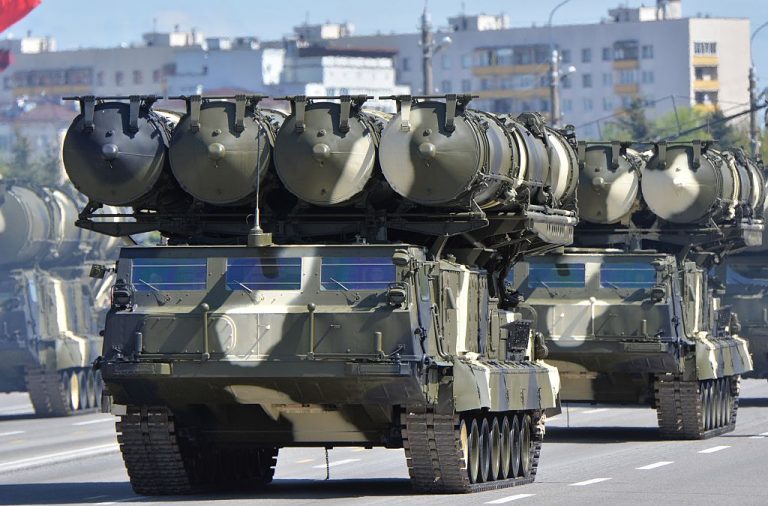According to the U.S. Department of Defense, the Russian military has not been able to gain air superiority over Ukraine despite having fought the country for more than a month.
Luo Zhengfang, a Taiwanese drone expert and chairman of GEOSAT Aerospace & Technology Inc. posted on his Facebook page on March 22 describing factors that complicate the Russian military’s efforts to gain the upper hand and quickly defeat Ukraine.
Space and information warfare
Luo said that space and information networks are the two major keys to victory in a modern war, but the Kremlin has been unable to prevail in either domain.
According to Luo, while the Russian army claims to have destroyed many important ground air defense radars in Ukraine, the defenders still managed to down a significant number of Russian aircraft. This would indicate that the Russian military is unable to properly monitor its aviation; meanwhile, the U.S. and NATO may be helping Ukraine monitor aerial targets.
The Ukrainian government claims that it has shot down 115 Russian aircraft since the invasion began on Feb. 24. Independent observation confirms a few dozen Russian aerial losses, mostly of ground attack aircraft and helicopters.
Success
You are now signed up for our newsletter
Success
Check your email to complete sign up
Luo described how the U.S. military uses sophisticated warfare technology that includes various military satellites for communications, remote sensing, synthetic-aperture radars and reconnaissance systems that are not affected by the weather and function 24 hours a day.
Assisting Ukraine’s resistance fighters
Although the U.S. and NATO have ruled out direct involvement in the war so long as Moscow does not enter NATO territory, the U.S. might be sharing what it sees via its Airborne Early Warning and Control (AEW&C) systems with Kiev, helping Ukraine’s fighters in detecting the trajectory of Russian aircraft and missiles.
The Ukrainian army would then feed this information to its anti-aircraft forces as a matter of course, Luo said.
Luo further observed that the Russian military has not been able to utilize advanced guided weapons as much as might be expected. In particular, the fact that many of Russia’s ballistic missiles either malfunctioned, crashed, or missed targets shows that the Russian navigation and satellite positioning system is weak.
Luo also claimed that Ukraine was able to take advantage of space and information networks to suppress various kinds of Russian search radar, effectively blinding the enemy and degrading their communication.
The expert somewhat dramatically added that “the Russian military became like scattered sand and was defeated one by one.”
Russia claims that it has achieved the effective neutralization of Ukrainian military aviation and air defenses, though it is unclear to what extent this is the case. Reports and footage of aerial combat have become fewer as the war drags on, though Russian missile, artillery, and bomber attacks continue across Ukraine targetting military bases and infrastructure.
Last week on March 18, a Russian MiG-31K fighter launched a Kinzhal hypersonic missile, which struck a Ukrainian military depot, according to the Russian Ministry of Defense. U.S. President Joe Biden later confirmed the use of the missile, a weapon he said was “almost impossible to stop.”
Taiwan keeping tabs?
Finally, Luo believes that the Ukrainian experience in the war could be a lesson for Taiwan. Though the self-ruling island is seemingly very connected to its democratic allies, assistance from the U.S.’s army structure and modern warfare equipment may prove to be vital tools for Taiwan’s survival if a war were to take place.
Taiwan, officially known as the Republic of China (ROC), once governed all of China before being forced off the mainland by communist rebels, who founded the People’s Republic of China (PRC) in 1949.
Beijing does not recognize either the ROC or an independent Taiwan, insisting that any country wishing to pursue diplomatic relations with it must first break official ties with Taipei under its One-China policy. This, in addition to Taiwan’s expulsion from the U.N. half a century ago, has resulted in the island being isolated from the global community.
Though Beijing has indicated its preference for a peaceful “reunification,” it does not rule out military force and has vowed to claim Taiwan by any means necessary. The mainland regime also views Taiwan as a renegade province that must be “returned to the homeland,” and has repeatedly threatened military action against any countries that defend its sovereignty.














